ARMS Review: Nintendo Succeeds With Its Surprisingly Fun Fighting Twist
- A refreshing take on the age-old fighting genre
- Offers a ton of depth despite its casual appearance
- Can be very difficult at times, which is a nice change for Nintendo
- Difficulty might be too high for people looking to pick up and play
- Motion controls are good, but have a steep learning curve
- Would benefit from a little more content
I have no problem admitting that ARMS has caught me off guard. What I'd initially written off as "just another motion control game" for a largely post-motion control world has turned out to be a very interesting and refreshing take on the fighting genre. Before we dive into the review, though, you should know ahead of time that these impressions are coming from someone who doesn't necessarily consider himself a fighting game fan.ARMS
Developer: Nintendo EPD
Publisher: Nintendo
Platform: Switch
Don't get me wrong, I've played my share of fighting games. Mortal Kombat was a favorite when I was a kid, as was Super Smash Bros. Street Fighters and Injustices have booted up on my machines in the past, but my interest has never stayed around long enough for me to actually get good at them. Typically, I'll learn two or three combos per character, play until I'm bored, and then move onto the next (usually non-fighting) game. I've never "mained" any one character in a fighting game, I watch fighting game tournaments in a state of constant awe, and quite frankly, I find fight sticks make me anxious.
ARMS, though, is different. It is unlike any fighting game I've ever played before, and in the case of a fighting game rookie like myself, that's a good thing. Instead of the 2D arena view most fighting games offer, ARMS shifts the perspective to behind your character and puts its own 3D spin on the genre. There's a good reason for this, as you're meant to hold one Joy-Con in each hand and swing your arms as if you were actually the one fighting.
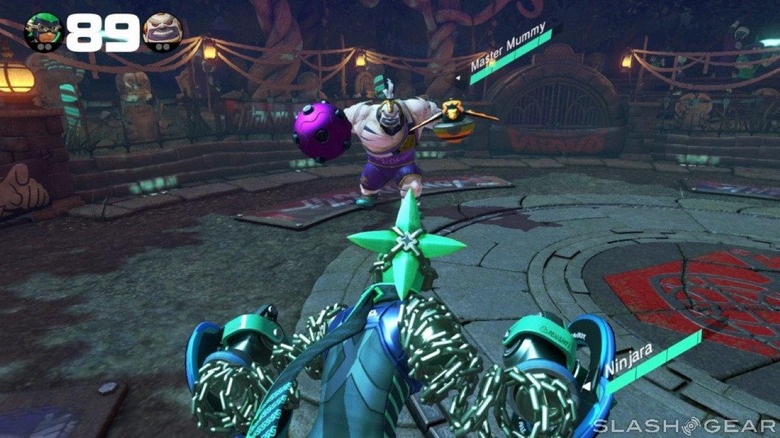
The motion controls in this game weren't a selling point for me at first, but after spending some time with ARMS, I'm convinced that motion controls are the best way to play the game. It's somewhat strange to be saying that, because the Wii's motion controls never clicked with me in a big way. Here they do, though, and it's due to the fact that they're very accurate. They aren't absolutely precise, but regardless, ARMS is a game that uses motion controls really well, and I think most players are doing themselves a disservice by playing with a Pro Controller or with the Joy-Con grip.
With that said, I really should point out that this game is difficult. This game clearly wasn't developed as just a proof of concept for the Switch's motion controls, but rather as a true one-on-one brawler that can be blisteringly hard at times. I am straight up awful at this game, and though I'm getting better, I'm far from actually being good. I want to get good, though, and as I've already indicated, that isn't something that happens often with fighting games.
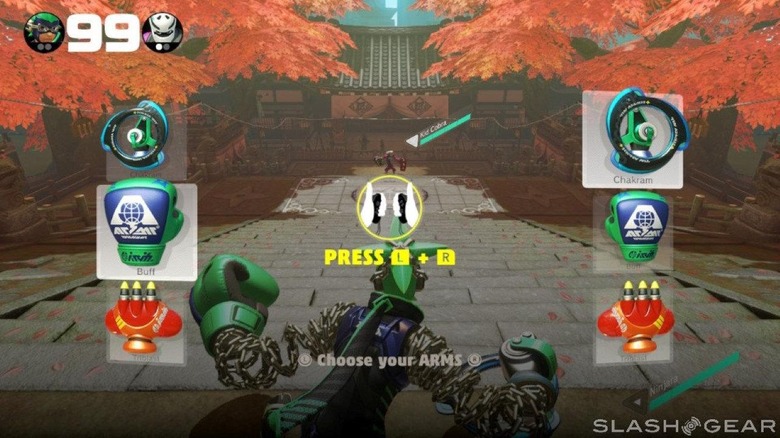
I think that's worth pointing out, because at the end of the day, I don't usually want to spend too long on games that are heavy on the adversity, especially when those games aren't in my wheelhouse to begin with. In this case, there's a hidden depth to ARMS that keeps drawing me in. Though you can get through at least the single player modes in most fighting games by button mashing your way to victory, that isn't going to work in ARMS, not even on easier difficulty levels.
Every move you make in ARMS needs to be calculated. You need to be watching your opponent for openings and tells from the start of the match, because missing those cues means that you're going to get punished. This is true for most fighting games, of course, but ARMS is particularly punishing when you get overzealous and begin swinging wildly. Refusing to think about each punch, each dash, and each move seems to be the best way to ensure a loss.
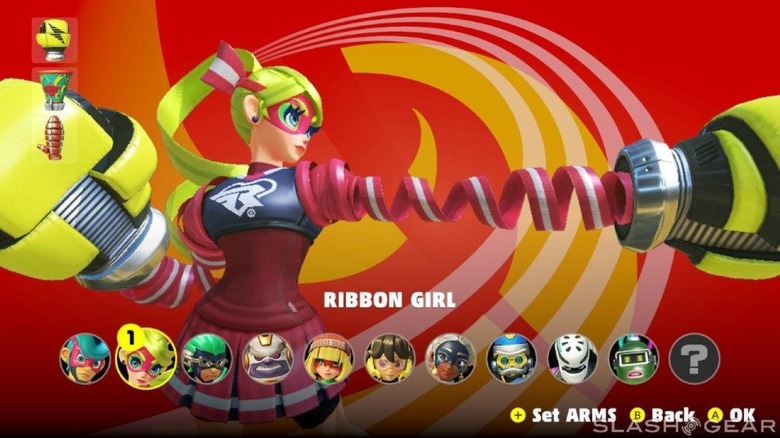
That's not even saying anything about the intricacies of each fighter – not only does each fighter have their own selection of arms to pick from, but they each have their own special abilities. On top of that, each different arm has its own function and weight, changing the way they fly through the air and how much damage they do. There's so much consider when picking a fighter and their loadout that I really think this can be a true competitive fighter, complete with its own metagame and everything.
On the surface, ARMS doesn't seem like it would hold so much depth. It's only when we begin to peel back the combat system's many layers that you understand just how much thought Nintendo put into this game. I expect this to become a favorite of not just Switch owners, but fighting game fans in general.
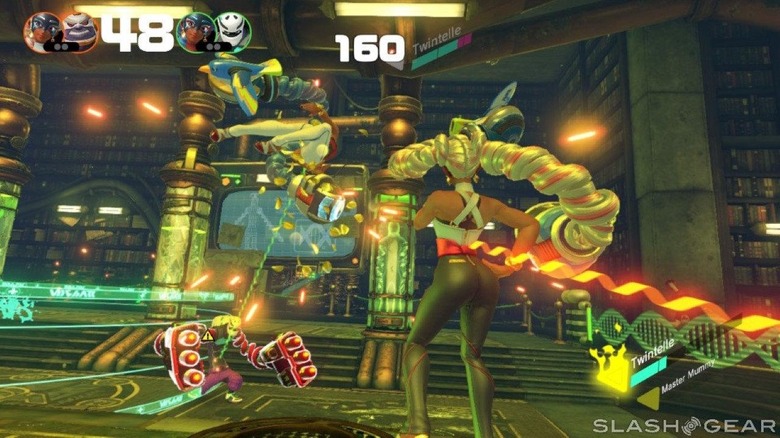
While I find myself quite impressed with ARMS, I do still have my gripes. As I've already indicated, the learning curve in this game is tough. I almost wonder if ARMS is trying to do too much differently, between things like curving your punches, choosing your loadout, and moving around a 3D arena. You have make a lot of considerations here that you don't need to make in other fighting games, and because of that, I fear that more casual players will ultimately put it down when ARMS doesn't click right away.
One thing to note, though, is that I offer this criticism without any idea of what Nintendo could have done differently. When ARMS does eventually click, everything Nintendo has done begins to make sense, and it becomes difficult to pick out a single component and say "the game could have really done without this." Perhaps the difficult learning curve is just the price we must pay for receiving a game that changes the genre this much?
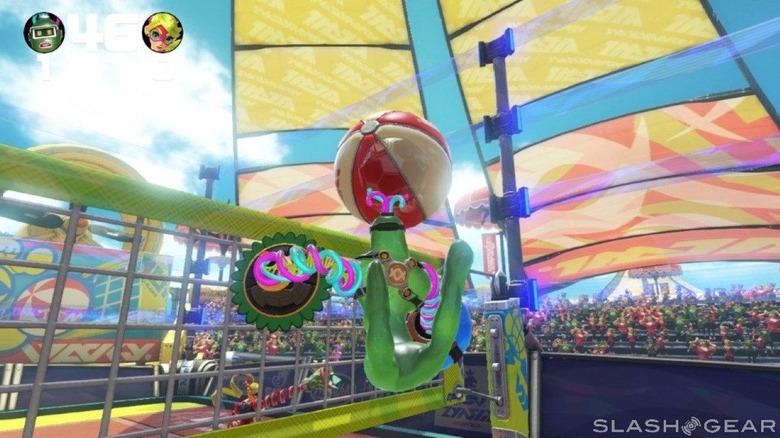
Another criticism I have is that there's a little less content than I would have liked. The main single player mode is Grand Prix, where you pick a fighter then enter into a series of one-on-one battles. Aside from Versus mode or the game's online one-on-one modes, Grand Prix is probably the most traditional game mode we see in ARMS.
Of course, you have your standard online modes as well, whether you want to dive into the Ranked mode and try hard, or hang out in party lobbies for some unranked battles. Given that the game isn't out until Friday, June 16, I haven't had much opportunity to really dig into the game's online modes, but I'll update this review after launch if there are any glaring problems with it.
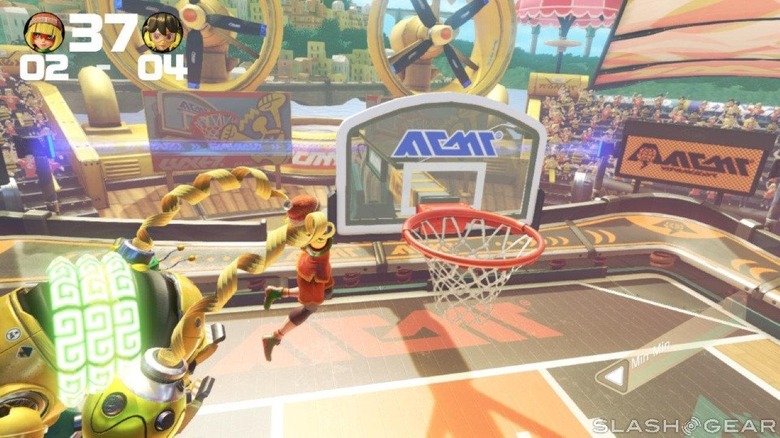
The game also packs six different game modes under the Versus umbrella. You've got the standard one-on-one fight mode, but if that's a little too tame for you, you can jump into the 2v2 Team Fight mode. This is unquestionably the most hectic mode in the game and ends up being one of the star modes of ARMS. In this mode, you're tethered to your teammate until one of you goes down, and your goal is to simply defeat the enemy team before they can defeat you.
Other modes found in the Versus section include V-Ball, Basketball, and Skillshot, one-on-one competitions where the focus is more on your technical ability than it is about beating the other player in a brawl. For instance, in V-Ball, you'll be playing a game of volleyball where you never touch the other player, while in Basketball, you'll need to perform throws on your opponent in order to score points (yes, you use your opponent as the basketball). Finally, we come to the 1-on-100 game mode, which pits you against 100 easily defeatable AI opponents with the ultimate goal being to defeat all of them. Super Smash Bros anyone?
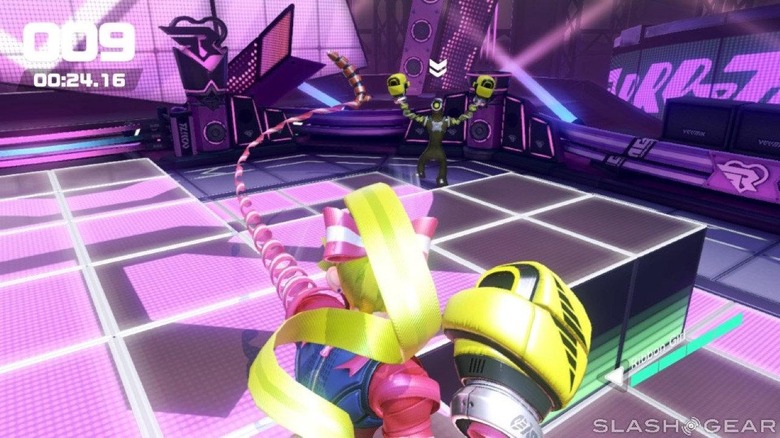
The comparison to Super Smash Bros is worth bringing up, because when compared to Nintendo's other fighting game series, ARMS does feel like it's lacking content. There are a bunch of arms to unlock, and that adds a lot of replayability, but it would have been cool to see something along the lines of Super Smash Bros' long-running event mode.
Wrap-Up
At the end of it all, though, those are small gripes. I still think that most people who pick up ARMS will enjoy their time with it, and I hope people do buy it, if only because it means that Nintendo will be able to refine and improve this excellent formula in a sequel.
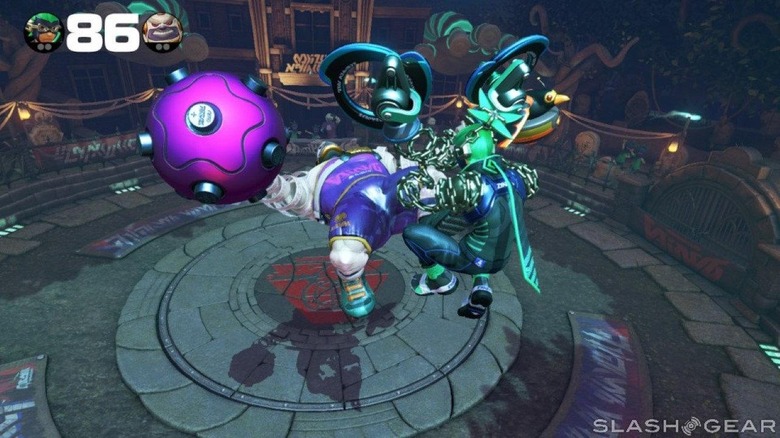
For those who are new to the fighting genre or merely casual fighting fans, I would proceed with a little bit of caution. Read a few more reviews or watch some livestreams of the game to make sure that ARMS is a game that you want to commit to learning. As I said, the learning curve will be steep for a lot of people, and if you're not willing to stick with ARMS until it clicks, you're basically wasting $60.
When it does click, ARMS shows that it's another title on a growing list of games that make the Switch a console with a bright future. I didn't expect to count it among the Switch's great games at first, but the amount of depth and the interesting take on the fighting genre make this game a must-have for any Switch owner willing to take a few punches on their way to victory.
